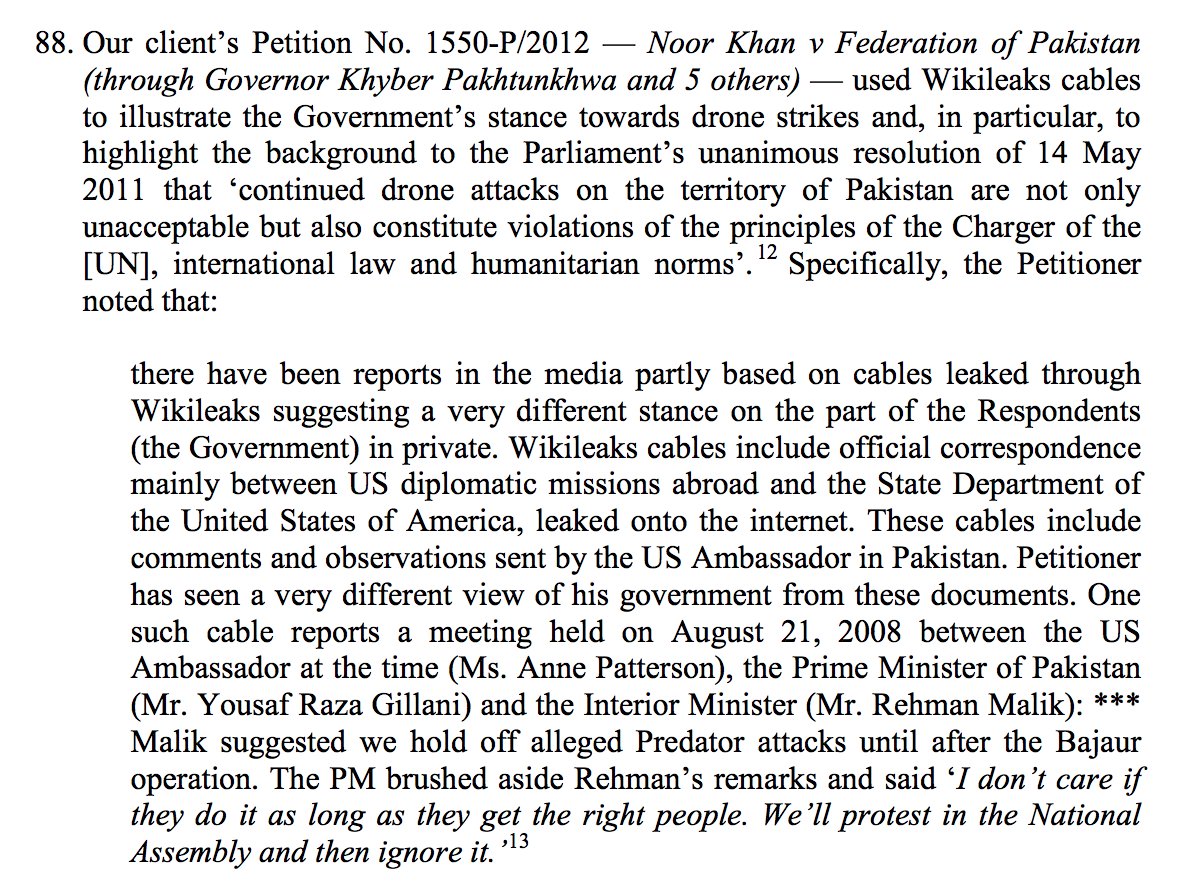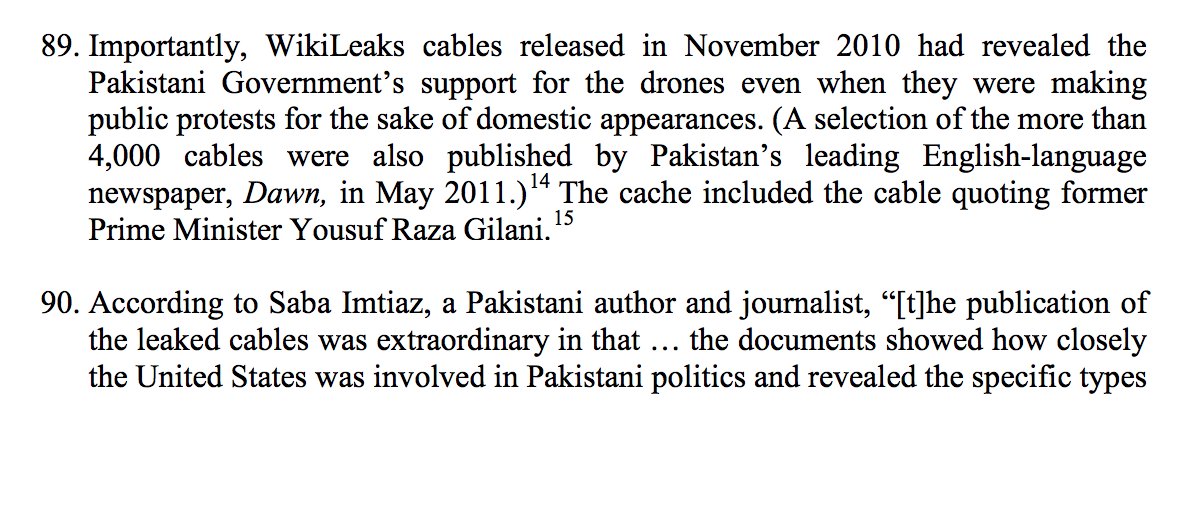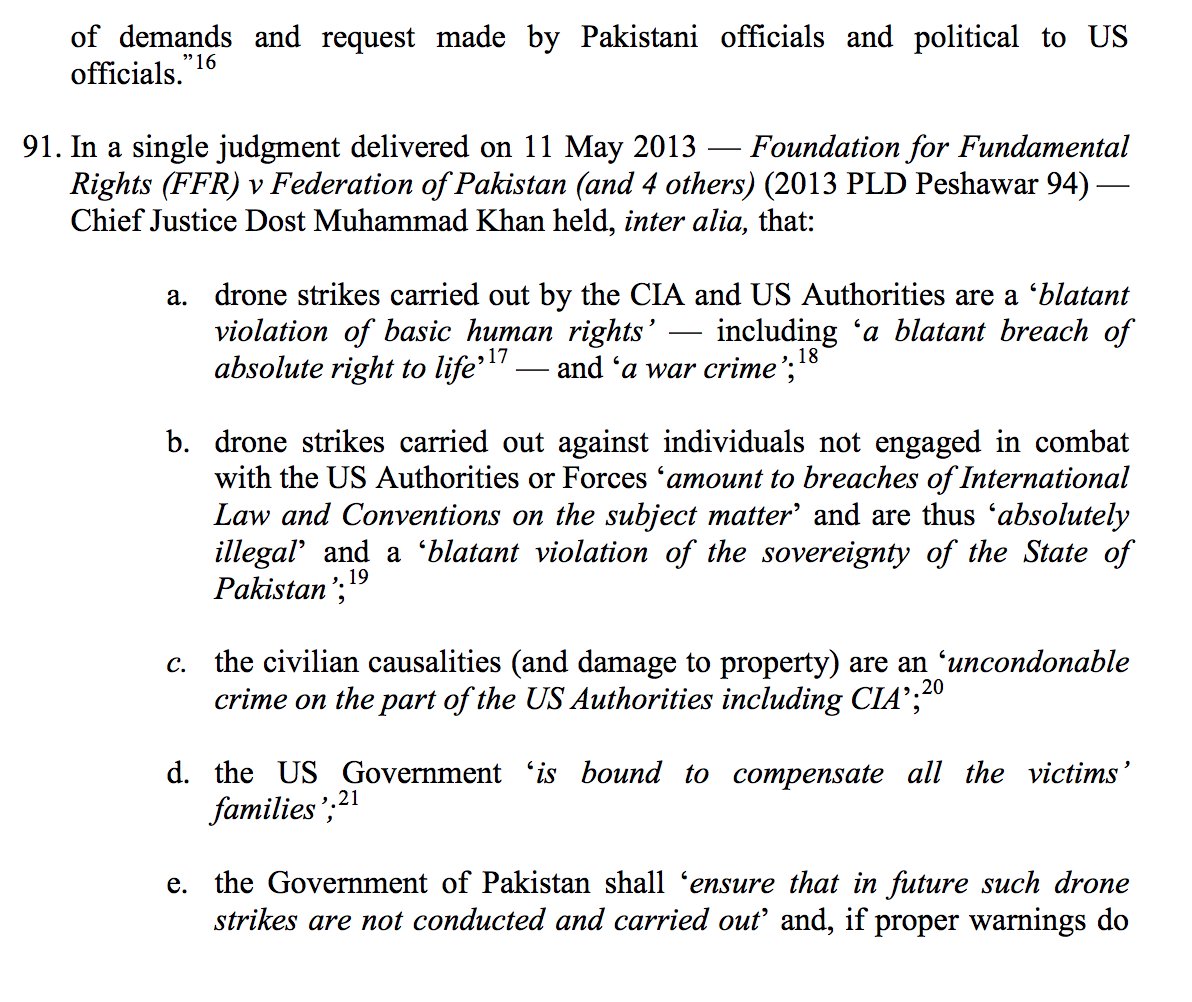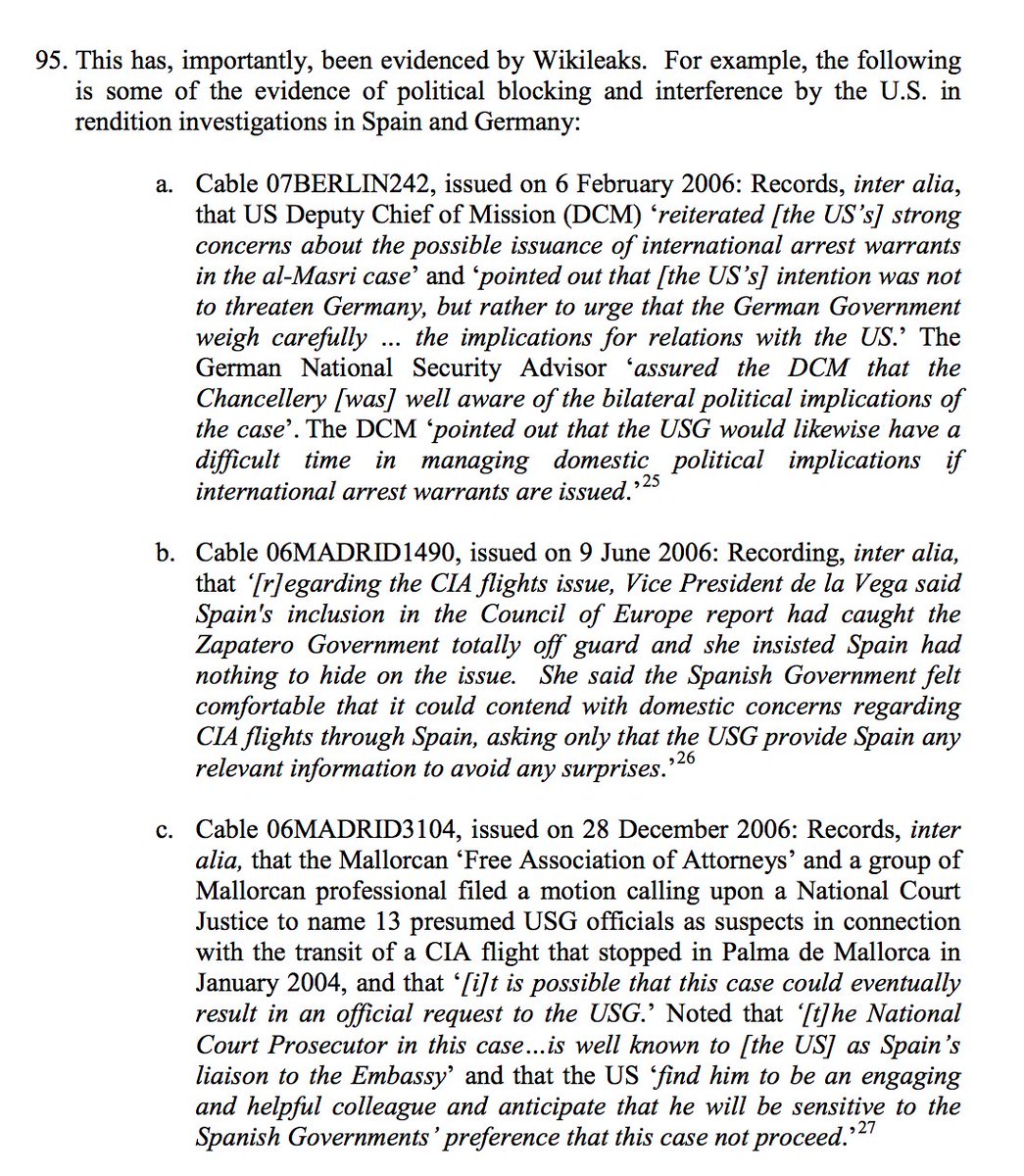The third day of proceedings in the trial portion of WikiLeaks founder Julian Assange's extradition hearing will begin shortly. I'll have live updates at this thread.
We are now starting 30 minutes later for the rest of extradition hearing so Assange can meet in person with his legal team each day.
On Day 2, human rights attorney Clive Stafford Smith testified in Assange extradition hearing.
Trump administration's retaliation against ICC officials investigating US torture and war crimes in Afghanistan—including by CIA—was highlighted by defense. https://shadowproof.com/2020/09/08/assange-team-extradition-torture-war-crimes-wikileaks/
Trump administration's retaliation against ICC officials investigating US torture and war crimes in Afghanistan—including by CIA—was highlighted by defense. https://shadowproof.com/2020/09/08/assange-team-extradition-torture-war-crimes-wikileaks/
Clive Stafford Smith's testimony on Day 2 specifically detailed how US diplomatic cables published by WikiLeaks helped to convince a court in Pakistan that CIA drone strikes violated human rights and were war crimes. #Assange
Not only did WikiLeaks expose evidence of US torture and war crimes, but the media organization also published documents showing how US officials obstruct investigations into these acts.
Also from Clive Stafford Smith on Day 2 #Assange
Also from Clive Stafford Smith on Day 2 #Assange
Court is in session. The first witness will be Paul Rogers, who is an emeritus professor of peace studies at Bradford University. His testimony will be used by defense to persuade judge Assange is targeted for political opinions.
Rogers: "Quite clear he is someone with strong political views" #Assange
Rogers testified Assange's opinions have resulted in clash with US administrations, including present administration that has moved to prosecute
Rogers: US gave "firm impression" that Afghanistan was under control. Some evidence existed that was not true. Evidence published by WikiLeaks confirmed "success was clearly not the case" #Assange
Rogers said WikiLeaks publication on Iraq "confirmed very strongly what had been apparent to some." Led to re-appraisal of Iraq War and acknowledgment of how it had gone bad and wrong for United States #Assange
Rogers emphasized that the Iraq War Logs "enabled a proper appreciation" for civilian deaths. Iraq Body Count did good work and through the incident reports found additional 15,000 civilian deaths #Assange
In talking about Assange's political views, Rogers referred to involvement in WikiLeaks Party in Australia in 2012.
Views are focus on transparency and accountability. Libertarian. Not limited to government but also includes corporations, trade unions, and NGOs.
Views are focus on transparency and accountability. Libertarian. Not limited to government but also includes corporations, trade unions, and NGOs.
Rogers referred to Mike Pompeo, Jeff Sessions, and Bill Barr in the Trump admin and said the Trump administration's hostility to Assange stems from their focus on what they perceive as "fake news."
They view Assange/WikiLeaks as threat to "normal political endeavors.
They view Assange/WikiLeaks as threat to "normal political endeavors.
Rogers: "This does appear to be a political trial." Previous administration considered 8-9 years ago but decided it was not appropriate to take action. #Assange
Rogers consistently emphasizes the political shift that has taken place in the White House which led to pursuing charges. Trump believes he is beset by threats from the press, including by networked Fourth Estate which WikiLeaks is a part #Assange
James Lewis did cross-exam for prosecution. He challenged Rogers' concept of what constitutes political opinion. He attempted to scrutinize statements Assange has made on transparency but Rogers easily demonstrated how they were political
Rogers replied to previously mentioned quote that it was interesting assessment suggesting as governments control more and more info, inevitable more info leaks out. Autocratic states hugely concerned with secrecy may be brought down by leaks. #Assange
As with Professor Mark Feldstein on Day 2, Lewis sought to contest whether Rogers was an "unbiased" expert. He objected to the fact that prosecutorial affidavits in the case were left out of his testimony. And questions became rather maddening for Rogers. #Assange
Lewis: Have you seen evidence indicting Mr. Assange?
Rogers replied he's tried to go over material but it is voluminous
Lewis repeated question then said no, Rogers hadn't because grand jury evidence remains under seal. #Assange
Rogers replied he's tried to go over material but it is voluminous
Lewis repeated question then said no, Rogers hadn't because grand jury evidence remains under seal. #Assange
Rogers clarified that, of course, he had not seen evidence the United States is "reserving for its own hearing."
And that he didn't know how strong the evidence is, but who does? Because it isn't public. #Assange
And that he didn't know how strong the evidence is, but who does? Because it isn't public. #Assange
Rogers attempted, though futilely, to make it clear his expert opinion was based on public information related to the case, and it is critically important to focus on change in politics in United States. #Assange
Lewis used Assistant US Attorney Gordon Kromberg's statements to insist federal prosecutors are required to act in manner free of political motivation
Rogers replied true in theory. But large portion of officials in US govt from political center (and can influence) #Assange
Rogers replied true in theory. But large portion of officials in US govt from political center (and can influence) #Assange
Lewis asked for evidence that actual prosecutors prosecute due to political bias other than standard criminal evidence
Rogers answered, "The person who directs Department of Justice is essentially a political appointee." #Assange
Rogers answered, "The person who directs Department of Justice is essentially a political appointee." #Assange
James Lewis read the rules for federal prosecution like they amounted to proof there is no political bias in the Assange case.
As Rogers said, the rules outline in theory how DOJ should operate. Doesn't mean it truly operates that way, free from politicization. #Assange
As Rogers said, the rules outline in theory how DOJ should operate. Doesn't mean it truly operates that way, free from politicization. #Assange
Lewis: If this was a political prosecution, wouldn't you expect Assange would be charged for publishing "Collateral Murder" video?
Rogers didn't understand what Lewis was getting at.
Rogers didn't understand what Lewis was getting at.
Lewis insisted the charges are narrowly limited to publications that named informants.
Rogers: "I understand that is what the prosecution is claiming."
Lewis didn't like the answer #Assange
Rogers: "I understand that is what the prosecution is claiming."
Lewis didn't like the answer #Assange
Rogers [re: prosecutors' interpretation of case]: "That is the case made against him, and we stand to hear that if it does [ever] come to court."
Repeated his focus, which is why is this case being prosecuted by Trump administration #Assange
Repeated his focus, which is why is this case being prosecuted by Trump administration #Assange
Lewis: "You don’t doubt or you’re not in position to say otherwise that there is not sufficient evidence to convict?
Rogers: "Since we have not heard the evidence, I can’t give a definitive answer to that." One cannot say "without knowing full evidence." #Assange
Rogers: "Since we have not heard the evidence, I can’t give a definitive answer to that." One cannot say "without knowing full evidence." #Assange
At this point in the cross examination, Rogers repeatedly asked to be able to elaborate and have time to fully answer questions put to him by the prosecutor. But Lewis would not allow him to speak fully. #Assange
Lewis moved on to repeating the same exact set of questions around coverage of the Obama administration and the decision to not prosecute Assange, which were put to Feldstein. I won't dwell on since Rogers' answers were close to what Feldstein said.
James Lewis, the prosecutor, seems to believe it is disputable and not a fact that the Obama administration didn't prosecute Assange. That's the only explanation I can come up with to explain why he's pursued these questions - twice. I question Lewis' grip on political realities.
Lewis, noting Assange was in the Ecuador embassy during Obama administration, asked, was it possible to arrest Assange?
Rogers: Is it necessary to actually be in a position to arrest before you actually decide to prosecute somebody? I’m not aware of that.
Rogers: Is it necessary to actually be in a position to arrest before you actually decide to prosecute somebody? I’m not aware of that.
I'm not aware of this US government position to not charge if they are not able to conduct an arrest. @Snowden was charged under Espionage Act while still in Hong Kong. It's not like they could easily get to him. This makes no sense at all.
Lewis (again): "What would be the point of indicting him when he was not available for trial?"
Rogers: You don’t know when he would be available for arrest. It would put a great deal of pressure on him and the WikiLeaks organization. #Assange
Rogers: You don’t know when he would be available for arrest. It would put a great deal of pressure on him and the WikiLeaks organization. #Assange
During redirect by Edward Fitzgerald, defense attorney, Rogers said Chelsea Manning's commutation just before Obama left office may have been factor in Trump administration's decision to prosecute Assange.
Court returns from lunch break and—
We can't hear court. So judge quickly goes back to recess to address another tech problem #Assange
We can't hear court. So judge quickly goes back to recess to address another tech problem #Assange
Court is back. Trevor Timm, co-founder of Freedom of the Press Foundation, takes the proverbial witness stand via video #Assange
The prosecution is giving defense witnesses 350-page plus bundles 24 hours before they are to testify, and they are expressing disbelief when they are not familiar with the contents. #Assange
I'll cover Lewis' cross-exam with Timm first then go back to highlight defense questions. Timm has been incredibly strong defense witness and formulated his answers in ways that make it impossible for prosecutor to trap him. #Assange
Lewis asked Timm if he feels threatened by prosecution
Timm said not myself personally. But he works on behalf of journalists, their work is under threat. #Assange
Timm said not myself personally. But he works on behalf of journalists, their work is under threat. #Assange
Lewis said but you tweeted a request for government employee to leak CIA torture report.
Timm replied, yes, I believe that is protected speech under the Constitution, but anybody who says that may find themselves under criminal liability [if prosecution succeeds] #Assange
Timm replied, yes, I believe that is protected speech under the Constitution, but anybody who says that may find themselves under criminal liability [if prosecution succeeds] #Assange
Lewis: You appear to have an interest in the outcome?
Timm said most press freedom advocates fear that prosecution will lead to prosecution of other full-time reporters. "I am testifying on this case for that reason." #Assange
Timm said most press freedom advocates fear that prosecution will lead to prosecution of other full-time reporters. "I am testifying on this case for that reason." #Assange
Lewis: Prosecution position in this case is Assange is not a journalist.
Timm: "I understand that...it doesn’t matter whether US government considers Assange a journalist." New York Times and other outlets don't need issued press pass to have First Amendment rights
Timm: "I understand that...it doesn’t matter whether US government considers Assange a journalist." New York Times and other outlets don't need issued press pass to have First Amendment rights
Lewis raised the government talking point that no responsible actor journalist or otherwise would publish names of individuals assisting US forces in war zones. And insisted that the Justice Department has gone out of its way to say they are not targeting journalists #Assange
Lewis asked, would responsible journalist, or in fact, any journalist publish name of third party when it is unnecessary to publish that name, when publishing would put that person's life in danger? #Assange
Timm answered, "Idea of who is or is not responsible journalist is different from what is illegal or legal conduct."
No court has said publication of names is illegal & Timm noted Congress considered law to make illegal after WikiLeaks publications. Didn't become law. #Assange
No court has said publication of names is illegal & Timm noted Congress considered law to make illegal after WikiLeaks publications. Didn't become law. #Assange
When pressed on whether he was saying he supported publishing cables with names, Timm said he did not think WikiLeaks had "perfect editorial judgement just like I'm not saying Guardian or NYT have perfect editorial judgement." #Assange
Timm continued, "Certainly do not think US government is entity that should be determining whether editorial judgments of a newspaper [were] sound or not."
Question isn't whether we agree with publication but if was illegal #Assange
Question isn't whether we agree with publication but if was illegal #Assange
Lewis: Why should your opinion be preferred over opinion of courts in United States?
Timm: "My opinion is in line with previous court opinions."
Never been publisher charged in this manner before, and Supreme Court precedent is "almost wholly on the side of Mr. Assange."
Timm: "My opinion is in line with previous court opinions."
Never been publisher charged in this manner before, and Supreme Court precedent is "almost wholly on the side of Mr. Assange."
Lewis: Perfectly legal to publish to publish names of informants knowing it’s likely to result in their death?
Timm: I don't think anybody knows. In Chelsea Manning's trial, US government couldn't point to specific deaths that resulted. #Assange
Timm: I don't think anybody knows. In Chelsea Manning's trial, US government couldn't point to specific deaths that resulted. #Assange
Lewis: You say this is a war on journalism. You stand by that?
Timm: "I'm very glad you brought that up."
He went on to outline how Trump has called press "enemies of the people" and disparaged them over 2200 times, particularly with his Twitter account. #Assange
Timm: "I'm very glad you brought that up."
He went on to outline how Trump has called press "enemies of the people" and disparaged them over 2200 times, particularly with his Twitter account. #Assange
In one spectacular moment, Timm was asked by Lewis—like previous witnesses—about statements from AUSA Kromberg in EDVA. He said he didn't think it was accurate to suggest Assange isn't being criminalized for passively receiving classified information.
Lewis: You said decision to indict was part of war on jouranlism. Wouldn't federal rules of prosecution be contrary to that?
Timm: "Yes, absolutely. This is why I am stating that I don't think this prosecution should go forward." #Assange
Timm: "Yes, absolutely. This is why I am stating that I don't think this prosecution should go forward." #Assange
Lewis: If this was a decision to indict Assange in war on journalism, would be contrary to federal rules. Them acting in bad faith. That's the consequence of your argument.
Timm: Yes, and if they did breach obligations, hope there would be accountability #Assange
Timm: Yes, and if they did breach obligations, hope there would be accountability #Assange
At this point, Summers, defense attorney rose to say Lewis' time was up. One hour had passed. Lewis was extremely upset. #Assange
The judge said she would allow him to continue, and they would reconsider time limits for witnesses. Rather petulantly, Lewis then shared, "Well, in fact, I'm finished." #Assange
I'd say both Timm and Rogers were very strong defense witnesses, especially because they were able to handle the lines of questioning from prosecutor James Lewis and not fall into any traps. #Assange
When defense questioned Timm, he highlighted the half dozen times in the past half century, where various US admins threatened to use Espionage Act against reporters but never made good on threats. #Assange
Summers asked Timm about the AIPAC case brought against Steve Rosen and Keith Weissman under the Espionage Act
They allegedly received information and passed that on to other journalists. #Assange
They allegedly received information and passed that on to other journalists. #Assange
In regard to the AIPAC case, Timm said, "Journalists were worried it could [lead] to cases against them."
US govt ultimately dropped the case, though one lawyer familiar with it told WaPo govt had wanted precedent as "a weapon that could be turned against media." #Assange
US govt ultimately dropped the case, though one lawyer familiar with it told WaPo govt had wanted precedent as "a weapon that could be turned against media." #Assange
Timm said the indictment makes it seem like having a submission system where whistleblowers can send documents is some "malicious anomaly." Or fact that WL was asking potential sources for info is criminal #Assange
. @FreedomofPress, where Timm is executive director, built a tool called SecureDrop, an open source version of a whistleblower submission system. He told court it is used by over 80 news organizations (Guardian, NYT, WSJ, USA Todya, etc). #Assange
The International Consortium of Investigative Journalists (ICIJ), known for Panama Papers investigation, explicitly state on their page that sources should leak to them. They solicit leaks, Timm told the court. This is common news practice in 2020. #Assange
I'll be live with a video report on Day 3 of Assange's extradition hearing in just a moment:
REPORT FROM DAY 3
Trump’s “war on journalism” take center stage during Julian Assange’s extradition hearing https://shadowproof.com/2020/09/09/trumps-war-on-journalism-takes-centerstage-at-julian-assanges-extradition-hearing/
Trump’s “war on journalism” take center stage during Julian Assange’s extradition hearing https://shadowproof.com/2020/09/09/trumps-war-on-journalism-takes-centerstage-at-julian-assanges-extradition-hearing/

 Read on Twitter
Read on Twitter






